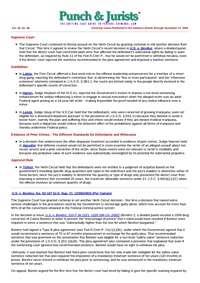In a decision that underscores the often-disparate treatment accorded to evidence of past crimes, the Court held that defense counsel would not be permitted to cross-examine the victim of an alleged assult about two recent arrests and a past conviction.
This decision is noted principally because of some …
After the three defendants in this case were charged with participating in a “large-scale” marijuana-cultivation venture, they pled guilty to maintaining a place for the manufacturing of marijuana, in violation of 21 U.S.C. § 856(a)(1). Their plea agreements allowed them to seek a downward departure on the grounds that …
The defendant in this case, Victor “Papito” Laboy, was one of a number of the members of the Latin Gangsta’ Disciples (“LGD”) street gang from Lawrence, MA who were prosecuted for selling heroin in 1999 and 2000. Laboy himself was charged with making three documented sales of heroin to …
The Court held that the defendants were not entitled to a judgment of acquittal based on the government's including specific drug quantities and types in the indictment and the jury's inability to determine those factors, since they are not elements.
In this case, the Court considered the consequences …
In this case, Judge Heyburn rejected the Government’s request to impose the two-level sentencing enhancement permitted under U.S.S.G. § 2A3.2(b)(2)(B) (for unduly influencing a minor to engage in sexual activity) - on the grounds that no minor was involved in the defendant’s crime of conviction - only an adult …
Defendant United States sought to obtain DNA blood test information from plaintiff, a federal inmate convicted of bank robbery, pursuant to the DNA Analysis Backlog Elimination Act of 2000 (DNA Act), 42 U.S.C.S. §§ 14135(a)-14135(e). The inmate challenged the blood test as unconstitutional under the Fourth Amendment, The Fifth …
The defendants in this case were charged with witness tampering. After opening statements, the defendants moved for a judgment of acquittal, asserting that the indictment failed to charge the necessary elements of first degree murder and was therefore time-barred. The District Court, construing the motion as one under Fed. …
United States v. Hebroni, No. 02-1106 (2nd Cir. 03/13/2002) (Per Curiam) (Unpublished)
United States v. Speed Joyeros, S.A., No. 00 CR 960 (E.D.N.Y. 2002) (Judge Weinstein)
In the 4/15/02 issue of P&J, we noted Judge Weinstein’s decision in U.S. v. Hebroni, 187 F.Supp.2d 75 (E.D.N.Y 2002) (Hebroni I) in …
